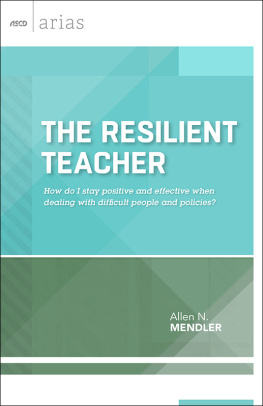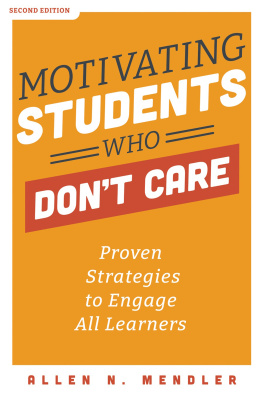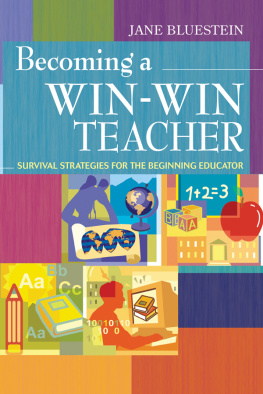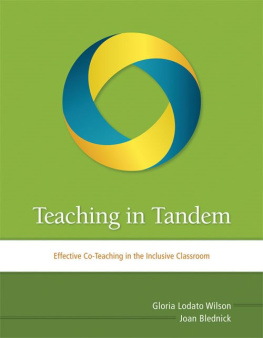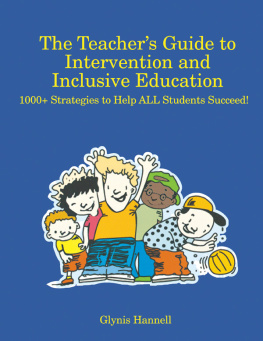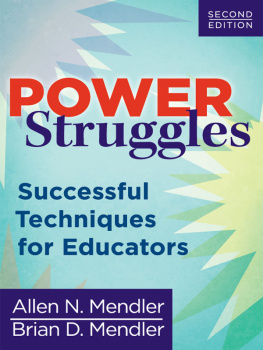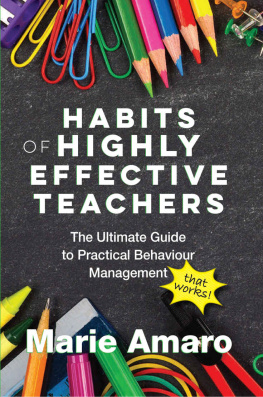


Introduction
Imagine a day when all your students, colleagues, and parents are pleasant, polite, and respectfulthey do the important things according to your preferences, and when they disagree, they express themselves without rancor, anger, or attitude. Imagine, too, that you have the freedom to teach your students according to their needs rather than to the dreaded test. If a student misbehaves and you send him to the office, you feel confident that you will get the support you seek; when you speak, your students, colleagues, and administrators really listen. When you call students parents, they are eager to resolve any issues rather than quick to cast blame at you. Your students are enthusiastic when they enter your room, and so are you. Hard as it may be to believe, your days can be exactly like this! Teaching needs to feel satisfyingyou owe that to yourself and, more importantly, to your students, who need you to be upbeat, energetic, and inspiring every day to motivate them to do their best.
Being a teacher has never been harder than it has been lately. It is no accident that teacher attrition rates grew by 50 percent between 1993 and 2008 (Kopkowski, 2008). The Common Core State Standards are confusing and ever-shifting. Decisions that affect you every day are being made far beyond your classroom. Students, parents, colleagues, administrators, and unseen state and national officials either dont seem aware of or dont care about the daily realities you face. Whether enshrined in policy or evident in the culture of your school or district, some approaches to teaching kids arent working, yet few seem willing to do anything about it.
Although there will always be some important issues over which teachers have little control, what you do and say when problems get in the way can often make the difference in achieving, reclaiming, or sustaining the fulfillment you and your students need. In these pages, you will learn how to make rigid policies more flexible, difficult students more cooperative, challenging parents more supportive, and dismissive colleagues more respectful.

The Formula for Happiness
The goal of this book is to enhance your happiness as an educator by providing you:
1. Knowledge of what to say and do when the behavior of your supervisor(s), students, their parents, or your colleagues is interfering with your ability to teach or the ability of your students to learn.
2. Confidence to convincingly express your thoughts and expectations to your students, colleagues, and parents.
3. Influence in being able to do what you think is best even in the face of disagreeable policies or curricula when teaching your students or managing their behavior.
Put simply, happiness = knowledge + confidence + influence.
Satisfaction can be hard to achieve. If you try to change everything at once, youll often change nothing and end up anxious, frustrated, and angry. Remember that you are far more likely to get what you want when you give others what they needa win-win situation. In the ensuing pages, you will find strategies for implementing change that will give you the confidence you need to take action when obstacles get in the way.

Preventive Maintenance: Six Attitudes That Promote Happiness
If you are unsatisfied at work, start by conducting an internal reality check. You may be missing moments of potential fulfillment simply because you arent paying close enough attention. Pick a random day and make a list of everything that goes right at work, including things that you tend to overlook (e.g., the custodian left the classroom floors nice and shiny, five students actually did their homework, no parents called to complain about anything, Maurice had one temper tantrum instead of his usual three). Making these kinds of lists regularly will help you to embrace the following six attitudes that are guaranteed to enhance your happiness.
1. Be grateful. I think at the core of so much unhappiness is the expectation that we somehow deserve better than we havebetter behaved students, better equipped classrooms, more supportive administrators, more realistic standards. Heres a tip: The next time you hear yourself thinking I deserve [blank], change the formulation to It would be nice if I had [blank], but I appreciate all that I do have.
Gratitude is the quickest route to feeling fulfilled, especially when youre sad, angry, or feel unappreciated. In reality, we educators have a pretty amazing life. Most of us have plenty of vacation time and get a chance to affect the lives of young people every day. Although we have a very challenging job, there is much for which to feel thankful. At least once a week, try to set aside 10 minutes to count your blessings. For example, you might reserve time on Friday afternoons to e-mail yourself a list of five things for which youre thankful that weeka list that you make a point to read first thing Monday morning.
2. Sweat the small stuff. Doing little things for others without expecting anything in return helps to build goodwill and encourages others to reciprocate. Offering an appreciative comment or a caring gesture takes little time and has no cost yet can have a profound effect on others. Consider for example the following letter to the editor I recently came across in my local newspaper:
I was having a very emotional time sitting in the supermarket trying to write a grocery list. I have lost six loved ones in the last two months, and all of a sudden I just broke down and started crying. I didnt realize anyone was watching me. When I was leaving the store, a total stranger stopped me and gave me a bouquet of flowers and a hug and told me that she would keep me in her prayers. It was like a miracle! I spent the rest of my weekend full of gratitude and crying tears of happiness.
Opportunities for showing students, colleagues, and parents that they matter abound. A caring touch to the shoulder of an unhappy child, a moment spent listening to a stressed colleague, a phone call home to share good newssuch small, thoughtful actions are the currency of greater satisfaction because of the affection and cooperation that they can engender. Isnt it easier to like the kids in your class who act friendly and interested? Arent you more apt to consider joining a committee when approached by a friendly colleague? Be determined to smile, nod, or say hello to everyone you encounter at least one day a week. On other days, commit to approaching at least one person you wouldnt usually reach out to and initiating a social interaction that lasts for at least one minute. Make these gestures part of your daily routine.
3. Make having fun a part of your job. If you need to justify having fun on the job, youll find plenty of research articles and testimonials online showing the many benefits of a fun workplace, from increased productivity to better health. For teaching to feel satisfying, I believe that work needs to feel playful at least 25 percent of the time. If you are fortunate enough to be at a school with open-minded administrators who put a premium on teacher satisfaction, you probably already have many opportunities to inject some playfulness into your work. If you are at a more formal institution, at the very least make a point of integrating fun stories or personal experiences into your daily instructional routines.
Next page
